Glossary P
Pimientos de Padron is also simply known as Padron, a variety of non-spicy pepper which originated from Padron, Galicia, Spain. In Spain, they are often serve as Tapa.
Padron is called Bratpaprika or Paprika grun in Germany.
Brat is translated as fry, roast or grill. Bratpaprika literally means "frying pepper", pepper intented for frying grilling or roasting and served as a side dish.
I love Padron very much. Whenever they are available in the supermarkets, I buy some packs and sautee them in olive oil and a bit of salt, sometimes I put a little amount of soy sauce and it taste good, too.
Below are pictures of fresh Padron and my sauteed Padron.
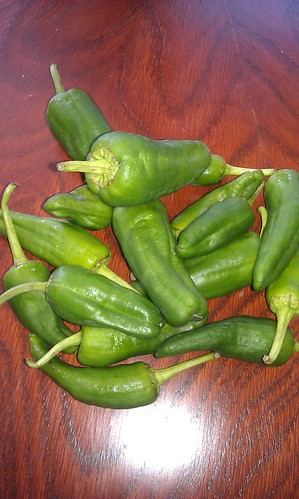
Padron being sauteed in Olive Oil and Soysauce, below with a dash of lemon juice, my own invention

This Padron travelled all the way from Spain to Germany.
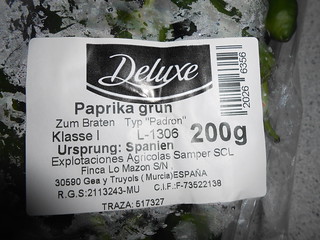
Pancit Habhab refers to one of the many kinds of noodle dish from the Philippines which traditionally served on the piece of banana leaf, drizzled with spicy vinegar and eaten without using the hands nor spoon or fork to put the noodles into the mouth , but directly thru ot to the mouth.
English: Pigik / Deutsch: Pigik / Español: Pigik / Português: Pigik / Français: Pigik / Italiano: Pigik /
Pigik refers to a prized and very expensive fish used for culinary purposes in Davao, one of the provinces in Mindanao Island of the Philippines. It is said that Pigik is a type of fish that only thrives in the brackish water of the Rio Grande river of Cotabato and those who tasted it swear that it has the tastiest meat but comes with a price of at least P 1,000.00 per kilo. When served steamed, it said to melt in the mouth and with slight firmness on the meat.
Pigik is called large scale grunter in English. Its species name is Terapon theraps. It is also called Imelda fish in Davao.
Pazham Puzhungiyathu refers to steamed or boiled banana plantain which is usually served as breakfast food in Kerala, India. It is often served with Puttu and sweetened Rava Upma.
Pazham is the Malayalam word for Banana and Pazham Puzhungiyathu means steamed bananas/plantains in Malayalam. There are different varieties of bananas in India used for cooking (frying, steaming, etc).

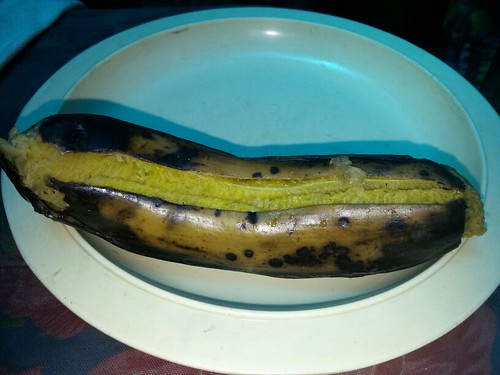

The last 2 pictures are steamed banana (Pazham Puzhungiyathu) eaten with Atta Puttu for morning meal or breakfast in Allepey, Kerala, India.
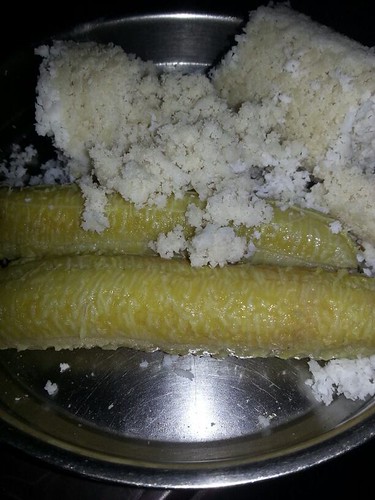
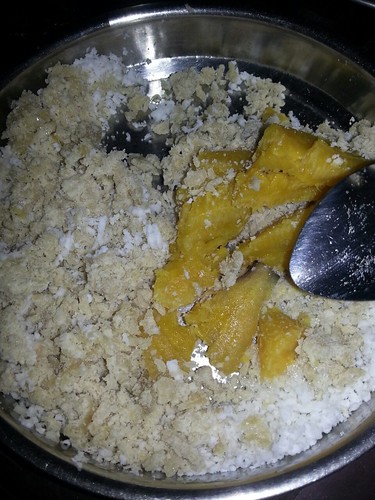
English: Potti/Pooti Olarthiyathu, Food in Kerala, India / Deutsch: Potti/Pooti Olarthiyathu, Essen in Kerala, Indien / Español: Potti/Pooti Olarthiyathu, Comida en Kerala, India / Português: Potti/Pooti Olarthiyathu, Comida em Kerala, Índia / Français: Potti/Pooti Olarthiyathu, Nourriture au Kerala, Inde / Italiano: Potti/Pooti Olarthiyathu, Cibo in Kerala, India /
Potti/Pooti Olarthiyathu refers to one of the dishes from Kerala, India which is stir-fry cow's intestines (Potti/Pooti). It is made from fresh and thoroughly cleaned cows/ goats or buffalos' intestines with lots of spices and curry leaves. It is usually served very spicy from chopped red chilies.
Parisienne refer to potatoes molded into balls with a melon scoop and fried or roasted.
It also refers to a sauce called Parisienne Sauce which is a rich, white, veal Velouté sauce prepared with white wine and mushroom essence, thickened with cream and beaten egg yolks and seasoned white pepper and lemon juice. Parisienne sauce, which is one of the basic sauces is used with veal and chicken dishes.
Parisienne sauce is said to have originated in the rich pasturelands of Bavaria in Germany and got its name for its blonde color rather than where it is originated.
Parisienne sauce is also known Sauce Allemande.
Parisienne also refers to a French long-shaped bread similar to Baguette but thicker and heavier than Baguette. It is made from wheat flour, water and yeast with crispier crust and soft crumb.
